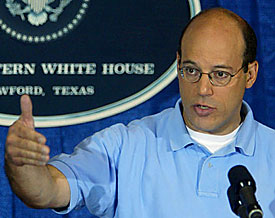 |
|
ASSOCIATED PRESS
|
White House spokesman Ari Fleischer addresses the press following President Bush's visit with Saudi ambassador Prince Bandar bin Sultan yesterday. Bush criticized Saudi Arabia's opposition to military action against Iraq, calling Saddam Hussein "a menace to the world."
|
|
Associated Press
Wednesday August 28, 2002
CRAWFORD, Texas ÷ President Bush confronted Saudi Arabia's top diplomat yesterday over Iraq and other issues chilling relations between the uneasy allies, calling Saddam Hussein "a menace to the world."
In an hour-long session with Saudi ambassador Prince Bandar bin Sultan, Bush expressed exasperation with the kingdom for failing to meet its commitment to provide financial assistance to the new government in Afghanistan.
Bush also cited "crying humanitarian concerns" as he accused the kingdom of dragging its feet in response to children abducted from the United States to Saudi Arabia.
The president did not sway Bandar on Iraq; U.S. officials said the Saudis still oppose potential military action against the Iraqi president.
Just hours before the meeting, Saudi Crown Prince Abdullah's foreign policy adviser said U.N. inspectors can contain any threat posed by Saddam "without firing a single bullet."
"There is no country I know of supporting the use of force in Iraq at this time," Adel el-Jubeir said in an Associated Press interview in Washington. "Your allies in Europe don't. Your allies in the Middle East don't."
Still, Bush aides cast the meeting as a positive development after weeks of tension between the U.S. administration and the Saudis.
White House spokesman Ari Fleischer said the meeting was "a social visit, as well as a business visit" that included a grilled-chicken-and-biscuits lunch and a coveted tour of Bush's 1,600-acre ranch.
Father of eight, Bandar brought his family, including one child who attends nearby Baylor University.
"They discussed a variety of issues, including prospects of enhancing peace in the Middle East. They discussed the war on terrorism and Saudi Arabia's cooperation in the war," Fleischer said.
The United States needs Saudi oil and a moderate Arab ally in the Middle East, but there are major sticking points in the relationship ÷ including the kingdom's opposition to war against Iraq, its weak human rights record and links to extremism and perhaps even terrorism.
The Saudis, in turn, bristle at suggestions that the government is responsible for the fact that 15 of the 19 Sept. 11 hijackers were Saudis. A lawsuit filed by family members of the Sept. 11 victims fueled perceptions in Saudi Arabia that the relationship is not valued by Americans.
Saudis were particularly upset by a private defense analyst's recommendations to a Pentagon advisory board that the ally be given an ultimatum to stop supporting terrorism or face retaliation.
Bush telephoned Crown Prince Abdullah on Monday to assure him the recommendation did not reflect his views.
As for Iraq, Bush told Bandar he had not decided whether to use U.S. military force, and promised to consult with the Saudis.
"The president made very clear again that he believes that Saddam Hussein is a menace to world peace, a menace to regional peace," Fleischer said.
A senior U.S. official, speaking on condition of anonymity, said that while opposing military action, Bandar expressed more sympathy with the U.S. position than Saudis generally do in public.
Egyptian President Hosni Mubarak, who sent his own troops against Iraq a decade ago as part of the U.S.-led Gulf War coalition, said yesterday that if the United States hits Iraq, no Arab ruler would be able "to curb popular sentiments." There might be repercussions and we fear a state of disorder and chaos."
In Washington, State Department spokesman Richard Boucher said the U.S had solid relations with Saudi Arabia, but said "We don't necessarily agree on every issue."

